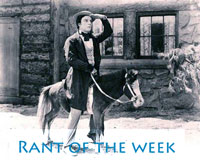Shirley MacLaine, in the documentary
The Celluloid Closet,
said that nobody on the set of
The Children's Hour
discussed the ramifications of the issues regarding homosexuality that are
implied, but never spoken about outright, in the film. She said, "none of us
were really aware. We might have been forerunners, but we weren't really,
because we didn't do the picture right. We were in the mindset of not
understanding what we were basically doing. These days, there would be a
tremendous outcry, as well there should be. Why would Martha break down and
say, 'Oh my god, what's wrong with me, I'm so polluted, I've ruined you.'
She would fight! She would fight for her budding preference. And when you
look at it, to have Martha play that scene - and no one questioned it - what
that meant, or what the alternatives could have been underneath the dialog,
it's mind boggling. The profundity of this subject was not in the lexicon of
our rehearsal period. Audrey and I never talked about this. Isn't that
amazing. Truly amazing." (IMDB)
One can only suppose that if
Maclaine were involved in a remake of "Huckleberry Finn", she would
re-imagine the 19th century as an era of enlightened, respectful attitudes
towards race and lovable colorful ethnically diverse towns and villages.
The word "nigger" would never appear. Why indeed does Martha break
down and declare that there must be something wrong with her? Because
it's the 1950's (or 40's or 30's, when the play was written by Lillian
Hellman). Of course Martha would believe there was something wrong
with her! That is precisely what was wrong with attitudes towards
homosexuality back then. Martha, incubated in a culture of ruthless
heterosexual orthodoxy, would have had no choice. It is only in the
modern era that homosexuals, knowing that the courts and the larger public
are on their side, see a viable path in standing up for their rights, and,
indeed, assert a claim on the definition of marriage.
And Maclaine's humanistic declarations aside, it would have been an
artistic mistake to incorporate anachronistic attitudes into a play set in
the 1930's. The beauty of "The Children's Hour", the film, is it's
incisive observations about society and children and young women trying to
establish themselves in the 1930's. Incorporating modern attitudes
about identity and self-actualization would have only served to allow casual
viewers to pat themselves on the back for being on the correct side of this
issue.


